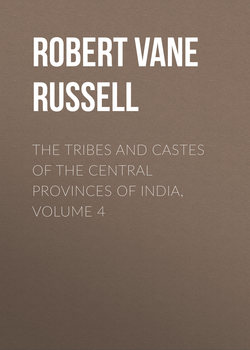Читать книгу The Tribes and Castes of the Central Provinces of India, Volume 4 - Robert Vane Russell - Страница 34
Part II
Articles on Castes and Tribes
Kumhār—Yemkala
Vol. IV
Kunbi
21. Food
ОглавлениеThe Kunbis eat three times a day, at about eight in the morning, at midday and after dark. The morning meal is commonly eaten in the field and the two others at home. At midday the cultivator comes home from work, bathes and takes his meal, having a rest for about two hours in all. After finishing work he again comes home and has his evening meal, and then, after a rest, at about ten o’clock he goes again to the fields, if the crops are on the ground, and sleeps on the mara or small elevated platform erected in the field to protect the grain from birds and wild animals; occasionally waking and emitting long-drawn howls or pulling the strings which connect with clappers in various parts of the field. Thus for nearly eight months of the year the Kunbi sleeps in his fields, and only during the remaining period at home. Juāri is the staple food of the caste, and is eaten both raw and cooked. The raw pods of juāri were the provision carried with them on their saddles by the marauding Marātha horsemen, and the description of Sivaji getting his sustenance from gnawing at one of these as he rode along is said to have struck fear into the heart of the Nizām. It is a common custom among well-to-do tenants and proprietors to invite their friends to a picnic in the fields when the crop is ripe to eat hurda or the pods of juāri roasted in hot ashes. For cooking purposes juāri is ground in an ordinary handmill and then passed through a sieve, which separates the finer from the coarser particles. The finer flour is made into dough with hot water and baked into thick flat chapātis or cakes, weighing more than half a pound each; while the coarse flour is boiled in water like rice. The boiled pulse of arhar (Cajanus indicus) is commonly eaten with juāri, and the chapātis are either dipped into cold linseed oil or consumed dry. The sameness of this diet is varied by a number of green vegetables, generally with very little savour to a European palate. These are usually boiled and then mixed into a salad with linseed or sesamum oil and flavoured with salt or powdered chillies, these last being the Kunbi’s indispensable condiment. He is also very fond of onions and garlic, which are either chopped and boiled, or eaten raw. Butter-milk when available is mixed with the boiled juāri after it is cooked, while wheat and rice, butter and sugar are delicacies reserved for festivals. As a rule only water is drunk, but the caste indulge in country liquor on festive occasions. Tobacco is commonly chewed after each meal or smoked in leaf cigarettes, or in chilams or clay pipe-bowls without a stem. Men also take snuff, and a few women chew tobacco and take snuff, though they do not smoke. It is noticeable that different subdivisions of the caste will commonly take food from each other in Berār, whereas in the Central Provinces they refuse to do so. The more liberal usage in Berār is possibly another case of Muhammadan influence. Small children eat with their father and brothers, but the women always wait on the men, and take their own food afterwards. Among the Dālia Kunbis of Nimār, however, women eat before men at caste feasts in opposition to the usual practice. It is stated in explanation that on one occasion when the men had finished their meal first and gone home, the women on returning were waylaid in the dark and robbed of their ornaments. And hence it was decided that they should always eat first and go home before nightfall. The Kunbi is fairly liberal in the matter of food. He will eat the flesh of goats, sheep and deer, all kinds of fish and fowls, and will drink liquor. In Hoshangābād and Nimār the higher subcastes abstain from flesh and wine. The caste will take food cooked without water from Brāhmans, Banias and Sunārs, and that mixed with water only from Marātha Brāhmans. All castes except Marātha Brāhmans will take water from the hands of a Kunbi.
Throwing stilts into the water at the Pola festival
